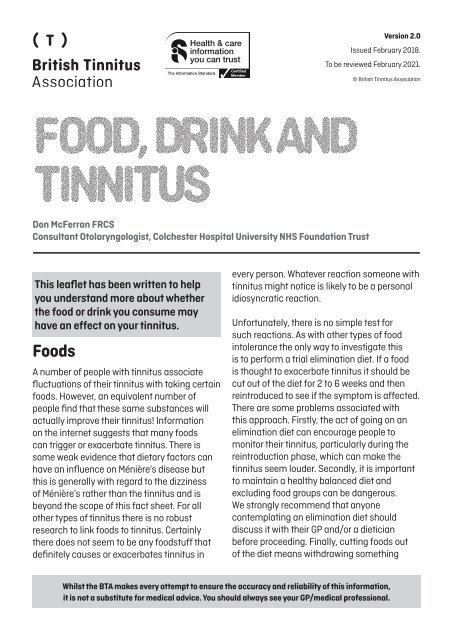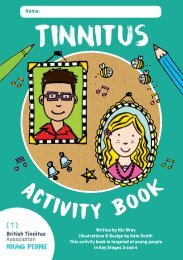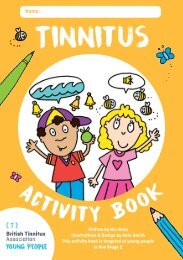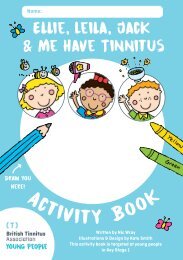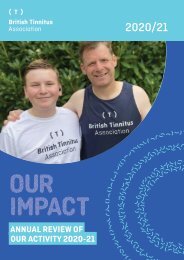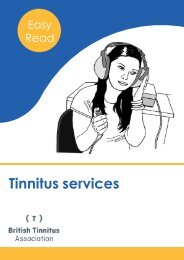Food drink and tinnitus Ver 2.0
You also want an ePaper? Increase the reach of your titles
YUMPU automatically turns print PDFs into web optimized ePapers that Google loves.
<strong>Ver</strong>sion <strong>2.0</strong><br />
Issued February 2018.<br />
To be reviewed February 2021.<br />
© British Tinnitus Association<br />
FOOD, DRINK AND<br />
TINNITUS<br />
Don McFerran FRCS<br />
Consultant Otolaryngologist, Colchester Hospital University NHS Foundation Trust<br />
This leaflet has been written to help<br />
you underst<strong>and</strong> more about whether<br />
the food or <strong>drink</strong> you consume may<br />
have an effect on your <strong>tinnitus</strong>.<br />
<strong>Food</strong>s<br />
A number of people with <strong>tinnitus</strong> associate<br />
fluctuations of their <strong>tinnitus</strong> with taking certain<br />
foods. However, an equivalent number of<br />
people find that these same substances will<br />
actually improve their <strong>tinnitus</strong>! Information<br />
on the internet suggests that many foods<br />
can trigger or exacerbate <strong>tinnitus</strong>. There is<br />
some weak evidence that dietary factors can<br />
have an influence on Ménière’s disease but<br />
this is generally with regard to the dizziness<br />
of Ménière’s rather than the <strong>tinnitus</strong> <strong>and</strong> is<br />
beyond the scope of this fact sheet. For all<br />
other types of <strong>tinnitus</strong> there is no robust<br />
research to link foods to <strong>tinnitus</strong>. Certainly<br />
there does not seem to be any foodstuff that<br />
definitely causes or exacerbates <strong>tinnitus</strong> in<br />
every person. Whatever reaction someone with<br />
<strong>tinnitus</strong> might notice is likely to be a personal<br />
idiosyncratic reaction.<br />
Unfortunately, there is no simple test for<br />
such reactions. As with other types of food<br />
intolerance the only way to investigate this<br />
is to perform a trial elimination diet. If a food<br />
is thought to exacerbate <strong>tinnitus</strong> it should be<br />
cut out of the diet for 2 to 6 weeks <strong>and</strong> then<br />
reintroduced to see if the symptom is affected.<br />
There are some problems associated with<br />
this approach. Firstly, the act of going on an<br />
elimination diet can encourage people to<br />
monitor their <strong>tinnitus</strong>, particularly during the<br />
reintroduction phase, which can make the<br />
<strong>tinnitus</strong> seem louder. Secondly, it is important<br />
to maintain a healthy balanced diet <strong>and</strong><br />
excluding food groups can be dangerous.<br />
We strongly recommend that anyone<br />
contemplating an elimination diet should<br />
discuss it with their GP <strong>and</strong>/or a dietician<br />
before proceeding. Finally, cutting foods out<br />
of the diet means withdrawing something<br />
Whilst the BTA makes every attempt to ensure the accuracy <strong>and</strong> reliability of this information,<br />
it is not a substitute for medical advice. You should always see your GP/medical professional.
that might have been pleasurable previously.<br />
Removing items of food that were previously<br />
enjoyed can add to the overall burden of<br />
<strong>tinnitus</strong>.<br />
Drinks<br />
Caffeine<br />
People with <strong>tinnitus</strong> are frequently told to avoid<br />
caffeine containing <strong>drink</strong>s such as coffee <strong>and</strong><br />
tea. There is no scientific rationale for this<br />
advice. A properly conducted scientific study<br />
showed that caffeine was not associated with<br />
<strong>tinnitus</strong> causation. Moreover, the researchers<br />
found that withdrawing someone from their<br />
usual intake of caffeine did produce side<br />
effects, particularly headaches <strong>and</strong> nausea,<br />
<strong>and</strong> this could potentially worsen pre-existing<br />
<strong>tinnitus</strong>. The sensible advice regarding tea or<br />
coffee <strong>drink</strong>ing therefore seems to be to stay<br />
on a fairly constant intake <strong>and</strong> not vary this too<br />
much from day to day.<br />
Alcohol<br />
It is often recommended that people with<br />
<strong>tinnitus</strong> should abstain from alcohol, with red<br />
wine frequently coming in for special criticism.<br />
Once again, there seems little hard evidence to<br />
justify these statements.<br />
The majority of the evidence that is available<br />
suggests that alcohol is more frequently<br />
helpful rather than harmful with respect to<br />
<strong>tinnitus</strong>. There have, however, been some<br />
pieces of research that have identified<br />
particular groups of people such as teenagers<br />
for whom alcohol does seem to be associated<br />
with increased levels of <strong>tinnitus</strong>.<br />
As with foods, a trial withdrawal <strong>and</strong><br />
reintroduction would seem to be the sensible<br />
way for an individual to establish whether<br />
alcohol is related to the level of <strong>tinnitus</strong>.<br />
A word of caution needs to be sounded here:<br />
some people find that alcohol actually helps<br />
their <strong>tinnitus</strong>. We should all keep our alcohol<br />
consumption within safe limits <strong>and</strong> people<br />
with <strong>tinnitus</strong> are no exception to this rule. The<br />
government advises that people should not<br />
regularly <strong>drink</strong> more than 14 units of alcohol<br />
per week. This is equivalent to:<br />
6 175ml glasses of 13% wine per week or<br />
6 pints of 4% beer or lager per week or<br />
5 pints of 4.5% cider per week or<br />
14 25ml measures of 40% spirits per week<br />
The guidelines are the same for men <strong>and</strong><br />
women.<br />
Tobacco<br />
It has been known for some time that tobacco<br />
smoking can contribute to inner ear hearing<br />
loss. The position with regard to <strong>tinnitus</strong> was<br />
less clear though recent research suggests<br />
that smokers have a small increased risk of<br />
developing <strong>tinnitus</strong>.<br />
References<br />
Cruickshanks KJ, Klein R, Klein BE, Wiley TL,<br />
Nondahl DM, Tweed TS. Cigarette smoking <strong>and</strong><br />
hearing loss: the epidemiology of hearing loss<br />
study. JAMA. 1998;279:1715-9.<br />
NHS Choices, <strong>Food</strong> intolerance. Available<br />
from https://www.nhs.uk/conditions/foodintolerance/pages/introduction.aspx<br />
Nondahl DM, Cruickshanks KJ, Huang GH,<br />
Klein BE, Klein R, Javier Nieto F, Tweed TS.<br />
Tinnitus <strong>and</strong> its risk factors in the Beaver Dam<br />
offspring study. Int J Audiol. 2011;50:313-20.<br />
Whilst the BTA makes every attempt to ensure the accuracy <strong>and</strong> reliability of this information,<br />
it is not a substitute for medical advice. You should always see your GP/medical professional.
Nondahl DM, Cruickshanks KJ, Wiley TL, Klein<br />
BE, Klein R, Chappell R, Tweed TS. The ten-year<br />
incidence of <strong>tinnitus</strong> among older adults. Int J<br />
Audiol. 2010;49:580-5.<br />
St Claire LS, Stothart G, McKenna L, Rogers<br />
PJ. Caffeine abstinence: an ineffective <strong>and</strong><br />
potentially distressing <strong>tinnitus</strong> therapy. Int J<br />
Audiol. 2010;49:24-9.<br />
Vanneste S, De Ridder D. The use of alcohol as<br />
a moderator for <strong>tinnitus</strong>-related distress. Brain<br />
Topogr. 2012;25:97-105.<br />
Alternative formats<br />
This publication is available in large print on<br />
request.<br />
For further information<br />
Our helpline staff can answer your questions<br />
on any <strong>tinnitus</strong> related topics on 0800<br />
018 0527. You may also find our website<br />
takeon<strong>tinnitus</strong>.co.uk helpful.<br />
BTA publications<br />
Our information leaflets are written by leading<br />
<strong>tinnitus</strong> professionals <strong>and</strong> provide accurate,<br />
reliable <strong>and</strong> authoritative information which<br />
is updated regularly. Please contact us if<br />
you would like to receive a copy of any of our<br />
information leaflets listed below, or they can<br />
be downloaded from our website. *available in<br />
Easy Read<br />
All about <strong>tinnitus</strong>*<br />
Balance <strong>and</strong> <strong>tinnitus</strong><br />
Complementary therapy for <strong>tinnitus</strong>: an<br />
opinion<br />
Drugs <strong>and</strong> <strong>tinnitus</strong><br />
Ear wax removal <strong>and</strong> <strong>tinnitus</strong><br />
Flying <strong>and</strong> the ear<br />
<strong>Food</strong>, <strong>drink</strong> <strong>and</strong> <strong>tinnitus</strong><br />
Hearing aids <strong>and</strong> <strong>tinnitus</strong>*<br />
Hyperacusis<br />
Ideas for relaxation without sound<br />
Information for musicians<br />
Musical hallucination (musical <strong>tinnitus</strong>)<br />
Noise <strong>and</strong> the ear<br />
Otosclerosis<br />
Pulsatile <strong>tinnitus</strong><br />
Relaxation<br />
Self help for <strong>tinnitus</strong>*<br />
Sound therapy<br />
Sources of mutual support for <strong>tinnitus</strong><br />
Supporting someone with <strong>tinnitus</strong><br />
Taming <strong>tinnitus</strong><br />
Tinnitus: a parent’s guide<br />
Tinnitus a teacher’s guide<br />
Tinnitus <strong>and</strong> disorders of the temporom<strong>and</strong>ibular<br />
joint (TMJ) <strong>and</strong> neck<br />
Tinnitus <strong>and</strong> sleep disturbance<br />
Tinnitus <strong>and</strong> stress<br />
Tinnitus services*<br />
Leaflets for children:<br />
Ellie, Leila <strong>and</strong> Jack have <strong>tinnitus</strong> (for under 8s)<br />
Tinnitus (for 8-11 year olds)<br />
Tinnitus (for 11-16 year olds)<br />
Ellie, Leila <strong>and</strong> Jack have <strong>tinnitus</strong> activity book<br />
(for under 8s)<br />
Tinnitus activity book (for 8-11 year olds)<br />
Tinnitus activity book (for 11-16 year olds)<br />
Whilst the BTA makes every attempt to ensure the accuracy <strong>and</strong> reliability of this information,<br />
it is not a substitute for medical advice. You should always see your GP/medical professional.
British Tinnitus Association<br />
Ground Floor, Unit 5, Acorn Business Park, Woodseats Close, Sheffield S8 0TB<br />
Email: info@<strong>tinnitus</strong>.org.uk<br />
Helpline: 0800 018 0527<br />
Website: <strong>tinnitus</strong>.org.uk<br />
The British Tinnitus Association. Registered charity no: 1011145 Company limited by guarantee no: 2709302. Registered in Engl<strong>and</strong>. This information has<br />
been produced by the BTA <strong>and</strong> conforms to the Principles <strong>and</strong> Requirements of the Information St<strong>and</strong>ard.<br />
Whilst the BTA makes every attempt to ensure the accuracy <strong>and</strong> reliability of this information,<br />
it is not a substitute for medical advice. You should always see your GP/medical professional.


